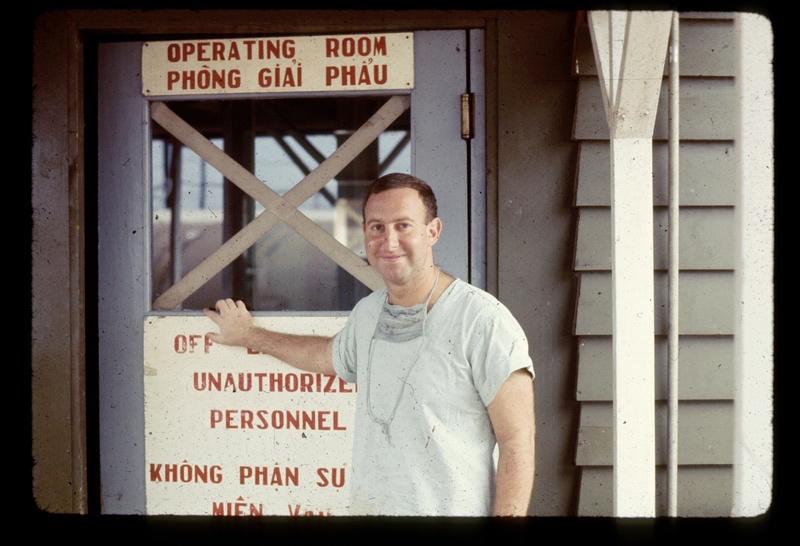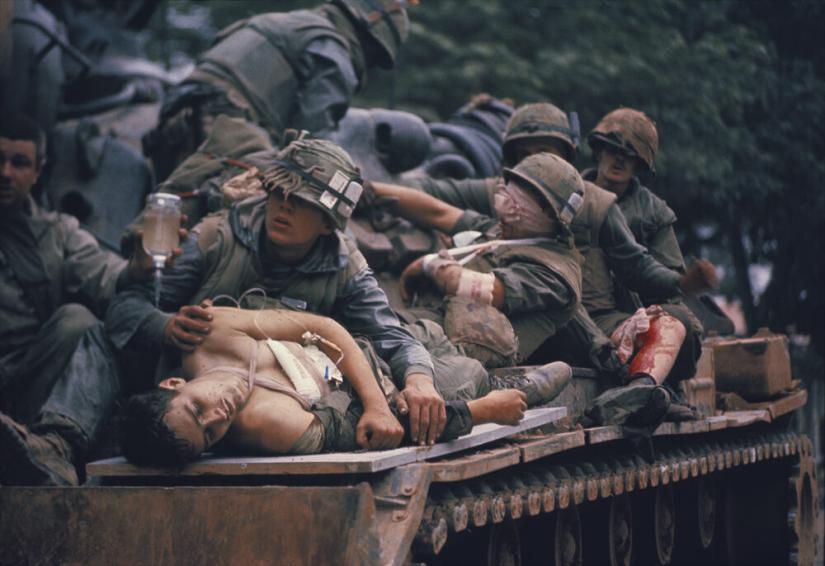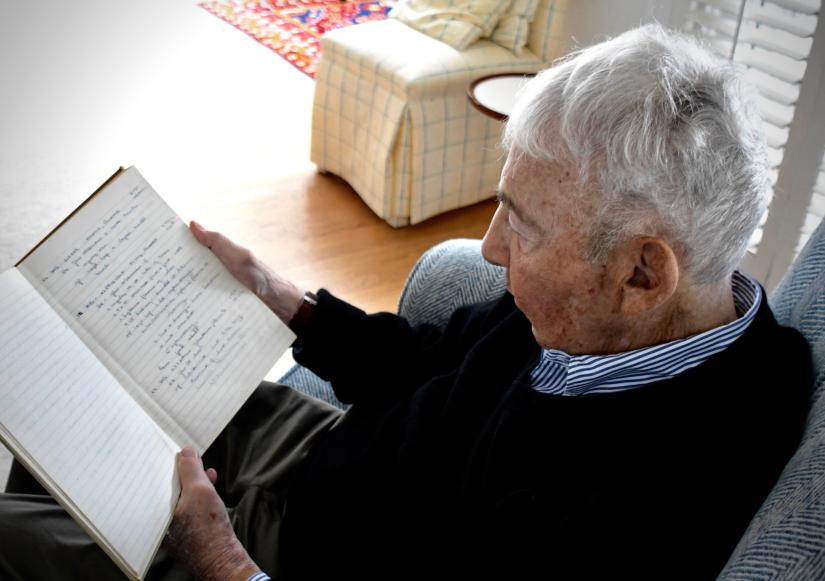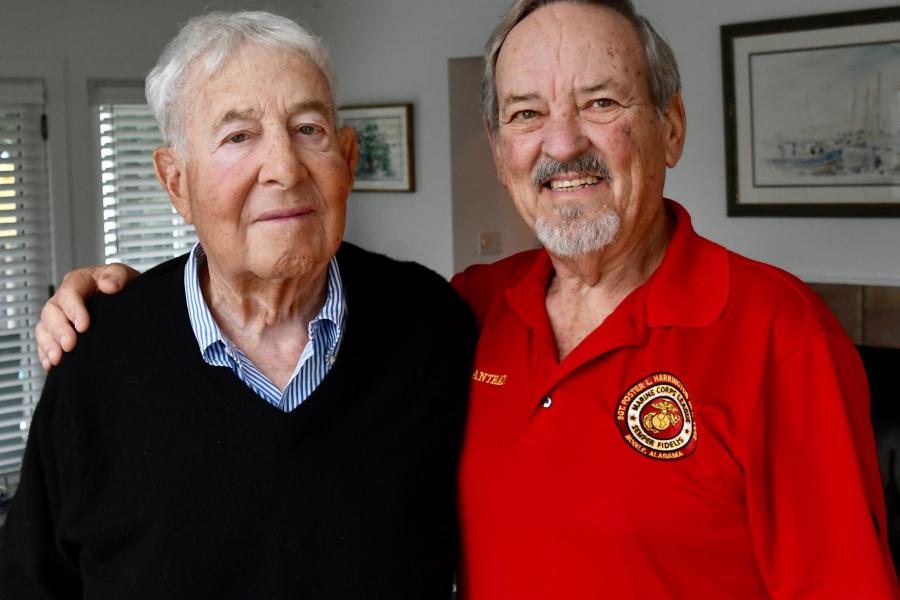Eighteen-year-old Alvin Bert "A.B." Grantham was lying in a body bag that was about to be zipped up when a fellow Marine, who noticed he was still breathing, said, "This one is not dead yet!"
It was Feb. 17, 1968, in the city of Hue, where Grantham had been shot during the bloodiest battle of the Vietnam War. But after being airlifted to a nearby mobile army surgical hospital (MASH), he was placed in the capable hands of Capt. Mayer Katz, A&S '58, who, at 30, was already a seasoned surgeon.

Image caption: Mayer Katz at the 3rd Marine Division hospital in Phu Bai near the demilitarized zone in Vietnam in 1968
Image credit: Courtesy Mayer Katz and Cape Gazette
The bullet, Katz recalls, entered through Grantham's chest and exited beneath a shoulder blade. While it missed both his heart and liver, it pierced a lung, causing a "sucking" wound—"which means, instead of expanding when you breathe, the lung collapses and blood comes out of the holes," Katz, now 86, explains. He and his surgical team spent the next several hours ligating arteries, taking out "shish-kabobbed pieces of rib," he adds, "and part of the right lower lobe of his lung."
Grantham was then airlifted to a hospital ship and, eventually, sent back to the United States, where he'd spend months in recovery. As for Katz, who performed more than 400 surgeries during the war and was decorated for removing a live grenade from another soldier, he went on to establish a venerable medical career which, among other accolades, earned him a Johns Hopkins 2023 Distinguished Alumnus Award. It also led, after five decades, to a reunion with Grantham, sparked by an iconic war photo.
Looking back, Katz says his life was shaped, in part, by Hopkins, where he played football, on both offense and defense. "That taught me two things—the value of teamwork," he says, "but also there's no bottom line to endurance. There's always another well you can draw from."
Born in 1937, Katz was raised in Baltimore, where his father was a retail merchant, his mother a homemaker who suffered from early-onset arthritis. By the age of 5, Katz knew he wanted to be a doctor and "that it wouldn't be long before I could cure her disease." His role models were two Hopkins-affiliated doctors, his pediatrician and his mother's physician. So it's no surprise that, after high school, he enrolled at Hopkins in 1954 and focused on the sciences.
Also see
Back then, students didn't have to declare a major. "Graduation requirements were to earn 120 credits, write and talk in either French or German, and swim a length of the pool," Katz recalls. "It was a trade school, which was perfect." A trade school on steroids, as "the professors," he says, "were the best in their fields." Among them, he fondly remembers Bill McElroy, a biochemist who'd later become director of the National Science Foundation, and Bentley Glass, a renowned geneticist. Competition among students was fierce, and no one was spoon-fed. "I learned how to be self-reliant," he says.
After graduating, Katz enrolled at the University of Maryland School of Medicine, where he quickly realized his calling. "The minute I walked in an operating room, I knew I was going to be good at it," he says. An internship at the University of California Hospital in San Francisco confirmed as much and coincided with the beginnings of the Vietnam War. Hospitals were not keen on possibly losing residents to the military, so Katz took advantage of the Berry Plan, which enabled aspiring doctors to defer service until they'd finished their residencies.

Image caption: John Olson was a photographer with Stars and Stripes when he took this photo of injured Marine A.B. Grantham, whom Mayer Katz would later save. Known as "The Marine on The Tank during the Battle of Hue," the photo was published in Life magazine and other publications around the world.
Image credit: John Olson
In 1963, he landed at Boston City Hospital, a massive public facility which, pre-Medicaid, offered free services to anyone who couldn't afford to pay. Which meant Katz was extremely busy. At UCSF, he says, "I did four operations. My first three months at City, I did 100."
Katz also met the love of his life in the OR, a surgical nurse named Nancy Nado. They soon married and would have two children—Pam, now a consultant in Princeton, New Jersey; and Stephen, now an architect in Chicago.
In July of 1967, with his residency finished, Katz was off to Vietnam. By early 1968, after the Viet Cong had launched the Tet Offensive, a major escalation of the war, he was with the 22nd MASH unit in Phu Bai, which, he says, "was shelled every night, because we were right by the battlefield." He operated mostly on those who, like Grantham, were battle casualties. But one soldier was an exception.
"Drugs were a problem in Vietnam," Katz says, "and two kids in the 101st [Airborne] decided to have a quick-draw contest with M79s." As in grenade launchers, with grenades the size of "four shotgun shells tied together," he adds. When the soldier arrived, "you could see it sticking out of his right cheek," Katz recalls. So Katz donned helmet and flak jacket, removed the grenade, and handed it over to an explosives expert, who threw it in a bunker, where it exploded. The ordeal earned Katz an Army Soldier's Medal.
After Vietnam, Katz returned to the States, where, over the next several decades, he founded vascular surgery units where none had existed before—first in Beloit, Wisconsin, then, in 1990, Lewes, Delaware, at Beebe Healthcare. He also helped develop a procedure in which a blocked carotid artery—a major supplier of blood to the brain—is cleaned, then patched with a vein from another part of the body.
The reunion with Grantham kicked off in 2017, when Katz was reading journalist Mark Bowden's book Hue 1968: A Turning Point of the American War in Vietnam. Included was a photo of a bandaged, unconscious Marine as well as other casualties being transported atop a tank. Shot by Stars and Stripes photographer John Olson and later featured in Life magazine, the now-iconic photo became known as "The Marine on the Tank." In his book, Bowden identifies Grantham as the Marine.

Image caption: Mayer Katz browses the detailed log he kept of every operation he performed in Vietnam
Image credit: Ron MacArthur / Cape Gazette
The name immediately rung a bell with Katz, who checked one of two logbooks in which he'd recorded every surgery he performed in Vietnam. Sure enough, he'd operated on Grantham.
With help from Pam, who found Grantham on Facebook, a phone call was arranged, and the two vets spoke for hours, making plans to meet in person. Then COVID hit and, in July 2021, Nancy passed away from ovarian cancer. It wasn't until September 2022, 54 years after they'd first met, that Grantham visited Katz at his home in Rehoboth Beach. Accompanied by his wife, Grantham, a successful businessman, was now the father of six, grandfather of 10.
Asked how he felt seeing Grantham in person, Katz struggles to find the words, then says, "You had to be there. It was just an emotional thing." It was also the subject of news stories, including one in his local paper, the Delaware Cape Gazette, and another in The Washington Post.
As for the alumnus award, Katz is characteristically modest, focusing instead on how Hopkins demanded "excellence" of all its students. And he insists that the 20,000-plus surgeries he performed were team, not solo, efforts. "My life revolved around surgery," he adds. "Being able to go into an operating room and put people back together, that's the key thing."
Posted in University News, Alumni
Tagged veterans day








